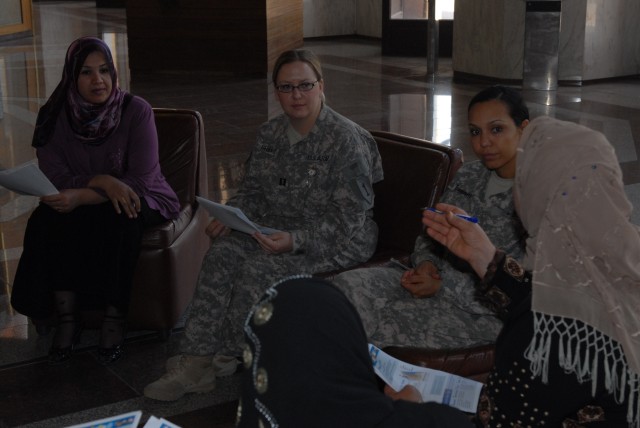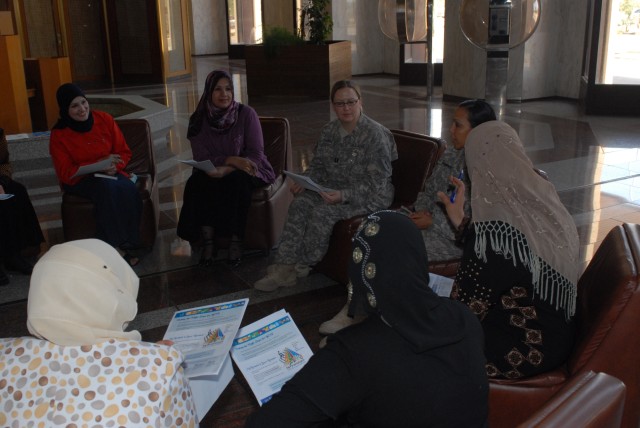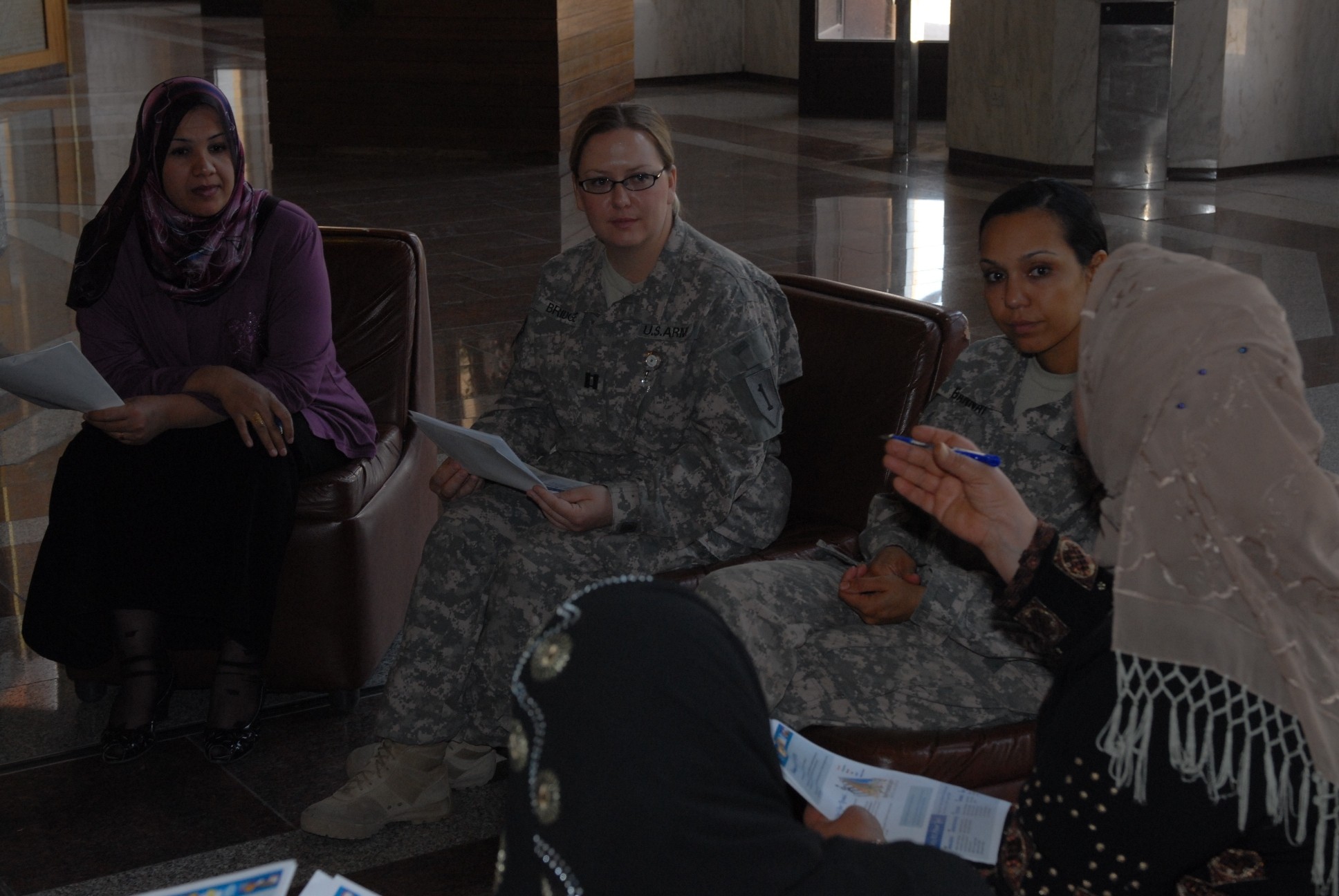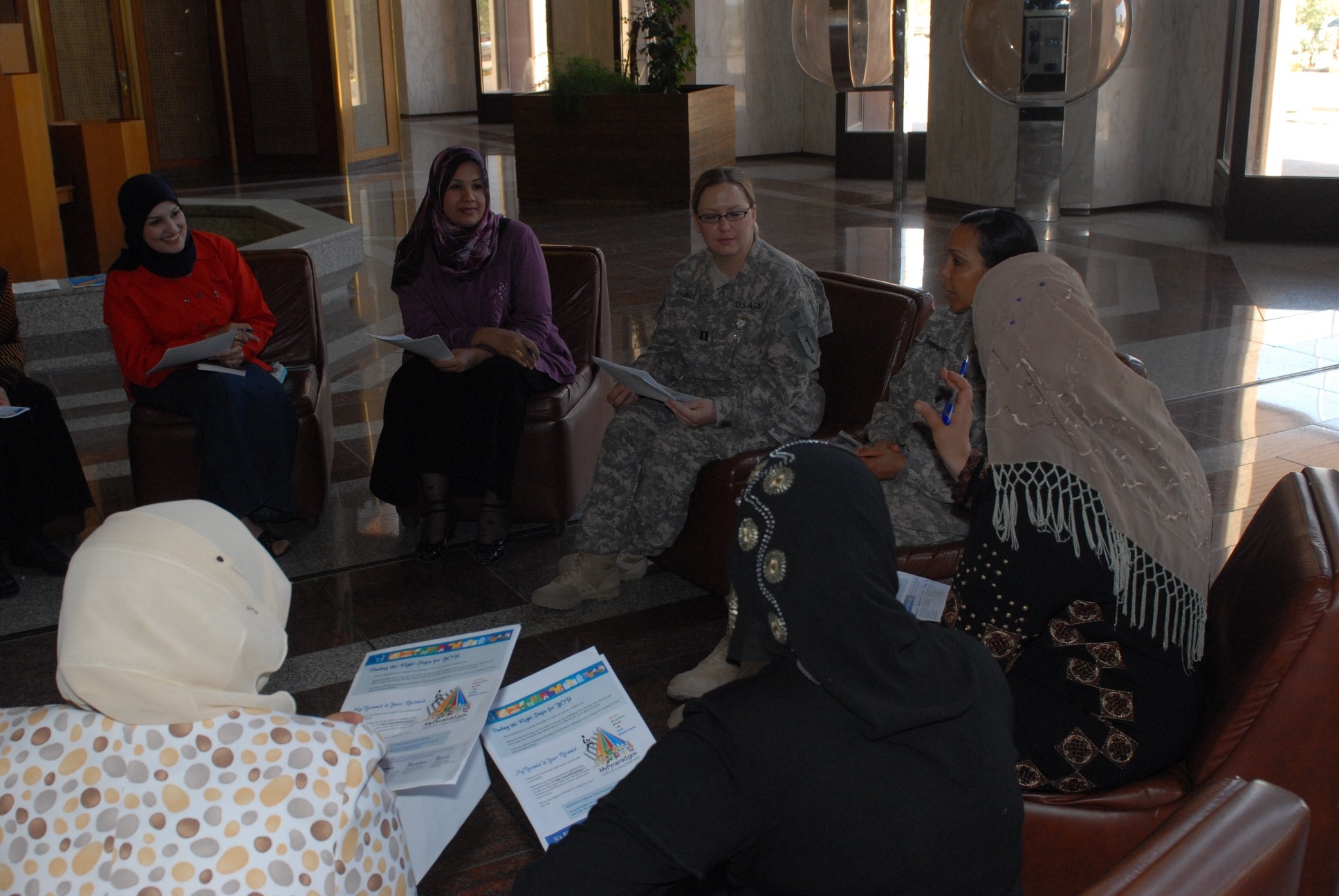COB BASRA, Iraq - What started as a class helping women employees of the Basra International Airport polish their English speaking and reading skills has quickly grown into a forum where women can freely discuss a variety of issues in a comfortable environment.
Capt. Tisha Bridge, 1st Infantry Division physician\'s assistant, and Spc. Aisha Bannat, an analyst with Division Headquarters and Headquarters Battalion, 1st Inf. Div., meet regularly with the workers, whose jobs at the airport necessitate good English skills.
"The classes began about two months ago with the initial intent to help the women employees with their English," said Bridge, a Sackets Harbor, N.Y. native.
A class held May 5, 2010, demonstrated some of the difficulties of cross-cultural relations, but also showed the genuine caring and interest of both the Iraqi students and the Soldier instructors that has been created over the past two months.
The class included vocabulary words and discussion questions on nutrition and health. The women also discussed what they like to do in their free time and where they would like to travel to if given the opportunity.
The students listened intently to things the instructors said and took the opportunity to practice the English they know, asking Bannat for assistance when they did not know the right words.
When the class first began, Bridge, a physician's assistant, incorporated common medical terms into the language lessons. The classes then grew into a way for the women to ask health questions they had about themselves and their family. This initial breakthrough still continues, even during lessons on other subjects. The class provides an environment in which the women feel open enough to discuss many topics.
"It helps them, I don't think they have a lot of exposure to doctors or medical guidance," Bridge said.
While the health care situation is improving in Iraq, access to routine medical care can be difficult due to the ratio of doctors to patients, a situation that can be compounded for women who traditionally are hesitant to see a male doctor.
"They had a lot of little questions about high blood pressure, diabetes, insomnia. Some of the women don't have access to the internet and those questions would go unanswered," Bridge said.
Providing advice to the students while improving their English is a rewarding experience, Bridge said. Being able to answer the women's questions has also helped build a rapport with the women, and the classes have taken on an atmosphere more like a gathering of friends.
Bannat, who is originally from Egypt but whose hometown is New York City, shares duties as an instructor and translator. "I feel that for all the struggles we go through to get the class going, that they still get some things out of it," Bannat said.
"I do see a lot of progress in their English, their attitude and they definitely learn about important health information. These women are very maternal, humble and hospitable. I'm glad to work with them any day of the week," she said.
Bannat is very engaged in the class, and the women look to her for specific words or phrases they need help with.
"I don't like to think of myself as a translator because I don't actually translate so much to them; I do teach them to read the words and understand the meaning," Bannat said. "They learn a few words here and there and I force them to use it."
She also feels a special closeness with the class because of her heritage, she said.
"We're helping these women with something they actually need. We also bring to them a bit of our culture and a bit of theirs. I can relate to both sides because of my background and upbringing, and can dissolve culture misunderstandings on both sides. There are not a lot of Arab females in the U.S. Army, so I think it empowers them to see that one of their own is doing that," Bannat said.
Nadal, a student in the class, has worked for the airport since 1986. Her job requires her to read parts manuals in English and she said the class is very beneficial.
"The good thing in this class is the conversations between me and the teacher, to know that I'm speaking English well or not, because some words I don't know well," Nadal said.
Nadal also said that just having the opportunity to use the English that the women know helps them because some of the women are a little shy or embarrassed to try their English out, fearing that it is not good enough. However, as she passed around home-cooked desserts to everyone in attendance, Nadal admitted that being shy is not a problem from which she suffers.
As the class ended, everyone said goodbye and the woman where told to think up new topics or lessons to learn for the next class. It was clear that finding things to talk about would not be a problem for the class. No matter the reach of the class' impact, its importance is clear to Bridge.
"[It shows] that the Americans are ready to help them and to share with them. Even if it makes an impact with just them or their family, then all of the time was worth it," Bridge said.




Social Sharing